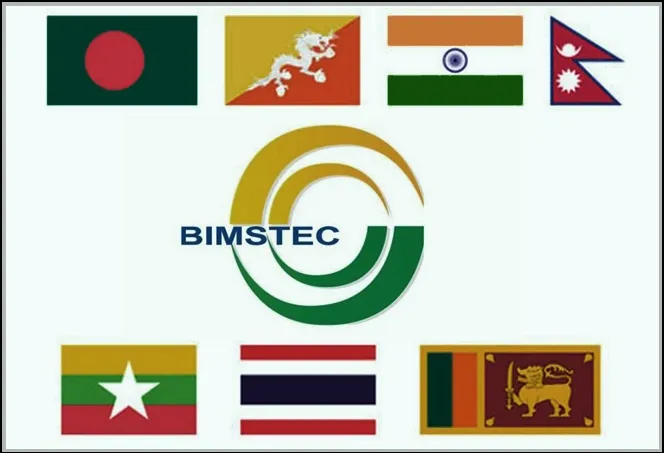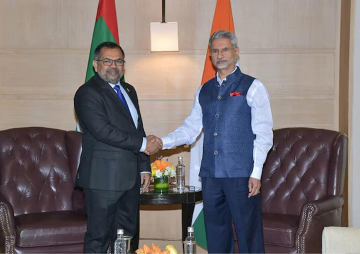A quarter of a century has passed since the formation of the Bay of
Bengal Multi-Sectoral Technical and Economic Cooperation, but it is only recently that BIMSTEC has begun to gain traction. The summit meeting next week in Sri Lanka is of particular consequence as for the first time BIMSTEC is scheduled to adopt a
charter that will lend clear purpose to the organisation and also rationalise its sectors of cooperation for better functionality. Devoted exclusively to the Bay of Bengal region, BIMSTEC has returned to the limelight in recent years with the rise in strategic significance of the Bay itself. It boasts of a membership encompassing all Bay littorals - India, Bangladesh, Sri Lanka, Nepal, Bhutan, Myanmar and Thailand - and is therefore ideally suited to be the platform for re-engagement to build a more collaborative future. From an Indian perspective it is also reassuring that the country’s aspirations find convergence with its role within the organisation.
Devoted exclusively to the Bay of Bengal region, BIMSTEC has returned to the limelight in recent years with the rise in strategic significance of the Bay itself.
After the marginalisation of SAARC since 2016 owing to tensions between India and Pakistan, a search for alternative regional collaborations led India to BIMSTEC. Centred on the Bay of Bengal, BIMSTEC was poised to connect the Greater Himalayan region with the Bay as well as act as a bridge between South and Southeast Asia. It thus echoed the country’s ambition of strengthening ties with its neighbourhood and create a maritime identity for itself. Thus driven, India convened the first
BIMSTEC Leaders Retreat in Goa at the end of 2016, taking the
first step to rejuvenate it after decades of inertia. The following year, at the organisation’s twentieth anniversary, June 2017, Prime Minister Modi declared BIMSTEC to be, “
a natural platform to fulfil our key foreign policy priorities of ‘Neighborhood First’ and ‘Act East’”. Since then, India has been undertaking initiatives to consolidate its role within BIMSTEC. The reorganisation of BIMSTEC’s areas of cooperation in the build-up to its 5
th Summit, has only served to facilitate this even further.
As agreed at the
17th BIMSTEC Ministerial Meeting held in November 2021, BIMSTEC decided to regroup its 14 diverse priority sectors into seven broad concerns, each under the lead of one member state; Trade, Investment and Development (Bangladesh), Environment and Climate Change (Bhutan), Security (India), Agriculture and Food Security (Myanmar), People-People contact (Nepal), Science, Technology and Innovation (Sri Lanka), and Connectivity (Thailand). India’s responsibility to lead the sector on ‘Security’ is in sync with its vision of ‘
Security and Growth for All in the Region,’-SAGAR, an idea the country has been nurturing in recent years as an extension of its Act East and Neighbourhood First Policy. In 2019, building upon this vision of SAGAR, the country announced its Indo-Pacific Ocean’s Initiative, to support the building of a rules-based regional architecture resting on seven pillars. Amongst these, three pillars; ‘
Maritime Security’, ‘Maritime Resources’ and ‘Disaster risk reduction’, resonate particularly well with its role in BIMSTEC. This is because the sector of cooperation on ‘Security’, embodies
three sub-sectors; ‘Counter Terrorism and Transnational Crime’ (CTTC), ‘Energy’ and ‘Disaster Management’.
CTTC had already been under India’s lead as had been the priority sector ‘
Environment and Disaster Management’. With ‘
Energy’ originally under Myanmar’s lead, joining the ‘Security’ bandwagon, India’s focus on non-traditional security concerns in the Bay has become more holistic.
India’s responsibility to lead the sector on ‘Security’ is in sync with its vision of ‘Security and Growth for All in the Region,’-SAGAR, an idea the country has been nurturing in recent years as an extension of its Act East and Neighbourhood First Policy.
India visualises itself as the ‘
net security provider’ of the region. This term can be traced to 2013 when India’s former Prime Minister Manmohan Singh, was commenting on the country’s aspirations to take a leading strategic role in the Indian Ocean while expanding into the Pacific. The Bay encounters a range of security concerns from the ‘natural’ to the ‘man made’. Indeed, the Bay is infamous for its turbulence with natural disasters wreaking havoc on its littorals. Transnational concerns such as terrorism, sea piracy, undocumented migration, human trafficking and Illegal, Unreported and Unregulated (IUU) fishing are just tip of the iceberg. Their sheer multiplicity makes it impossible for any country to single-handedly address these concerns. Within the ‘Security’ priority sector under India’s umbrella, a ‘
Shepherd Country’ has been assigned for each Sub-Group; Prevention of Illicit Trafficking in Narcotics Drugs, Psychotropic Substances and Precursor Chemical (Myanmar), Intelligence Sharing (Sri Lanka), Legal and Law Enforcement Issues (India), Anti- Money Laundering and Combating the Financing of Terrorism (Thailand), Cooperation on Countering Radicalization and Terrorism (India) and Human Trafficking and Illegal Migration (Bangladesh).
BIMSTEC continues to suffer from some serious challenges that include institutional fragility, the weakness of its Secretariat, the paucity of consolidated funding and the absence of clear guidelines. Hopefully the promised Charter will resolve many of these, and the organisation will be able to realise its true potential, especially in an environment that is evolving faster than the ability of the regional states to manage it. After all, BIMSTEC can only be as successful as its member states commitment to it and perhaps time has come for the Bay of Bengal community to commit itself to the idea of regional cooperation and coordination.
The views expressed above belong to the author(s). ORF research and analyses now available on Telegram! Click here to access our curated content — blogs, longforms and interviews.




 PREV
PREV



